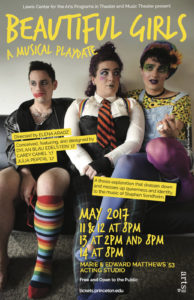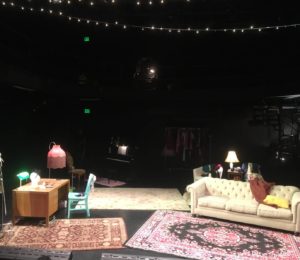In between classes, extracurriculars, and my Spanish and Portuguese thesis, I’ve spent the last year developing a new musical that runs Thursday May 11 through Sunday May 14 — Beautiful Girls: A Musical Playdate. Developed with two other theater certificate students, the play uses music by Stephen Sondheim to explore themes of friendship, queerness, and identity, and how all of these can and cannot be distilled in the clothes we wear. Looking back on this yearlong project, I realize it has helped me reconnect with what makes both research and creative work so fulfilling: the freedom to explore, improvise, and think beyond what has already been made.

When we started the project, we knew just a couple things about the show: 1) There would be only three actors: the three thesis students. 2) We would use songs by the versatile composer Stephen Sondheim. 3) We would queer this material by performing songs from a number of Sondheim’s shows, regardless of each character’s gender, personality, or “type.”
At our first production meeting, Vince, the music director, suggested it could be wildly fun to put our own mark on each song: adding voice parts to solos, layering different songs on top of each other, or even changing musical styles. This would require weekly sessions for musical improvisation. Rather than calling these “music rehearsals,” which implied some sort of set music to learn, we decided to call them “musical playdates.”

The term gets at the playful, childlike, and freely creative core of our process. Playdates are times for kids to invent games, play dress-up, and imagine new worlds. Our music sessions were similarly lively and collaborative. For instance, in one of our first sessions, we tackled “Know Things Now” from Into the Woods. In the song, Little Red Riding Hood reflects upon the experience of getting eaten by a wolf. Though upbeat and comic, the song also contains echoes of sexual trauma. We sought to bring forward this subtext through musical arrangement. After exploring a few ideas, we decided to do the song in a minor key and layer in music from Sweeney Todd, a play about a murderous barber who turns his customers into meat pies. “Know Things Now” suddenly became darker and less innocent: no longer the song of a child, but that of a more self-aware and experienced person. Play and experimentation led us to something new.
I’ve found this “playdate” perspective fruitful outside of theater, as well. As I wrote in December, I began my academic thesis not with an outline but with free writing. Following a summer of research, this was the best way for me to organize my thoughts and to allow for ideas to build off of each other in an improvisational manner. It was also fun. Rather than feeling rigidly stuck to an outline, the paper became a liberating space for recounting stories, connecting them to one another, and reflecting upon my research.
As students, we often see long academic projects as drudgery. The pressure to get a good grade or meet a certain standard often places the end goal above the in-the-moment experience. This playdate approach pushes against that. Handing in my academic thesis last week, I turned in the product of a personally gratifying year of work. And as I approach Beautiful Girls’ opening night, I once again have a sense of fulfillment. I am so excited to share my playtime with others. (You may get tickets here!)
— Dylan Blau Edelstein, Humanities Correspondent

